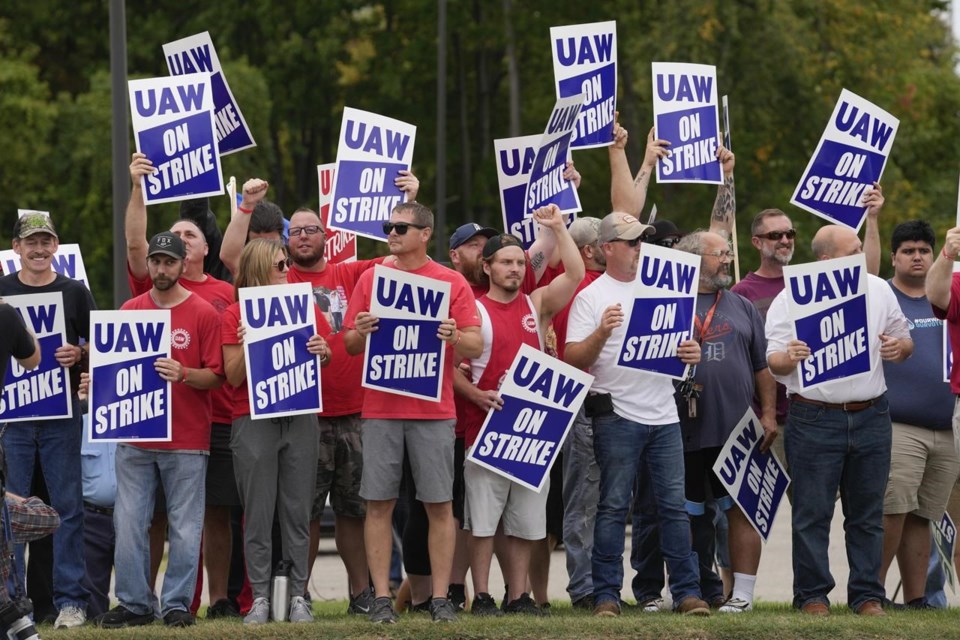DETROIT (AP) ŌĆö union members have voted to approve a new contract with General Motors, making the company the first Detroit automaker to get a ratified deal that could end a contentious labor dispute and a series of punishing strikes.
A vote-tracking spreadsheet on the unionŌĆÖs website shows that with all local union offices reporting, the contract passed by just over 3,400 votes, with 54.7% in favor. A union spokesman on Thursday confirmed that the spreadsheet had the official GM totals.
The outcome was closer than expected after the UAWŌĆÖs celebrations of victories last month on that led to six weeks of targeted walkouts against GM, Ford and Stellantis, the maker of Jeep and Ram vehicles.
On Thursday the contract had a big lead in voting at Ford and Stellantis. Ratification was leading at Ford by more than 10,000 votes, with 66.7% of ballots in favor. At Stellantis, the lead was over 5,700, with 66.5% voting for the deal, according to the UAW website.
Voting continues at Ford through early Saturday with only two large factories in the Detroit area and some smaller facilities left to be counted. At Stellantis, three Detroit-area factories were the only large plants yet to vote, with tallies expected to be complete by Tuesday.
The three contracts, if approved by 146,000 union members, would dramatically raise pay for autoworkers, with increases and cost-of-living adjustments that would translate into a 33% wage gain. Top assembly plant workers would get immediate 11% raises and earn roughly $42 per hour when the contracts expire in April of 2028.
At GM, about 46,000 workers were eligible to vote on the deal, and about 36,000 cast ballots.
Of the four GM plants that went on strike, workers at only a large SUV factory in Arlington, Texas, approved the contract. Workers in Wentzville, Missouri; Lansing Delta Township, Michigan; and Spring Hill, Tennessee, voted it down. Workers said that longtime employees at GM were unhappy they didnŌĆÖt get larger pay raises like newer workers, and they wanted a bigger pension increase.
ŌĆ£I'm not ungrateful, but I feel like it could have been better,ŌĆØ said Andrea Repasky, a body shop worker at GM's pickup truck factory in Ft. Wayne, Indiana, who voted against the deal.
Repasky said she's happy that temporary workers will be hired faster and won't have to wait multiple years to reach the full assembly worker pay rate, now about $32 per hour. She's also glad that workers at parts warehouses and component factories will get the top wage.
But she says she'll get only $4 per hour more at ratification, and her pay will have gone up only $7 per hour since 2006 due to concessions made to help the company out of dire financial straits during the Great Recession. ŌĆ£I would have been happy if we would have gotten a bigger jump up front,ŌĆØ she said. ŌĆ£I just think in 17 years, $7 more is not too good of a deal.ŌĆØ
She also wanted to see larger pension increases as well as defined benefit pensions and health care in retirement for workers hired after 2007. With GM making healthy profits, she's worried that the union may have missed the chance to get more because the company may not be doing as well in 2028.
Many newer hires wanted defined benefit pension plans instead of defined contribution plans. But the companies agreed to contribute 10% per year into 401(k) plans instead.
Keith Crowell, the local union president at GM's Arlington plant, said the factory has a diverse group of workers from full- and part-time temporary hires to longtime assembly line employees. Full-time temporary workers liked the large raises they received and the chance to get top union pay, he said. But many longtime workers didnŌĆÖt think immediate pay raises were enough to make up for concessions granted to GM in 2008, he said.
ŌĆ£There was something in there for everybody, but everybody couldnŌĆÖt get everything they wanted,ŌĆØ Crowell said. ŌĆ£At least weŌĆÖre making a step in the right direction to recover from 2008.ŌĆØ
Citing the automakers' strong profits, UAW President Shawn Fain has insisted it was well past time to make up for the 2008 concessions.
Marick Masters, a business professor at Wayne State University in Detroit, said GM has more older workers than the other two companies, so he expected the vote to be closer there. About half of GM's factory workers were hired before 2007. ŌĆ£They may have felt they were not listened to enough,ŌĆØ Masters said of the workers.
He expects the contracts to be ratified at Ford and Stellantis and said only lopsided votes against the deals that run counter to the current trends could sink the agreements. ŌĆ£It certainly seems that they're on track to pass,ŌĆØ he said.
President Joe Biden has hailed the resolution of the strikes as an early victory for what he calls a worker-centered economy. But the success of the contracts will ultimately hinge on the ability of automakers to keep generating profits as they shift toward electric vehicles.
Thousands of UAW members joined picket lines in targeted strikes starting Sept. 15 before the tentative deals were reached late last month. Rather than striking at one company, the union targeted individual plants at all three automakers. At the peak of the strikes, about 46,000 workers a were walking picket lines.
Tom Krisher, The Associated Press



